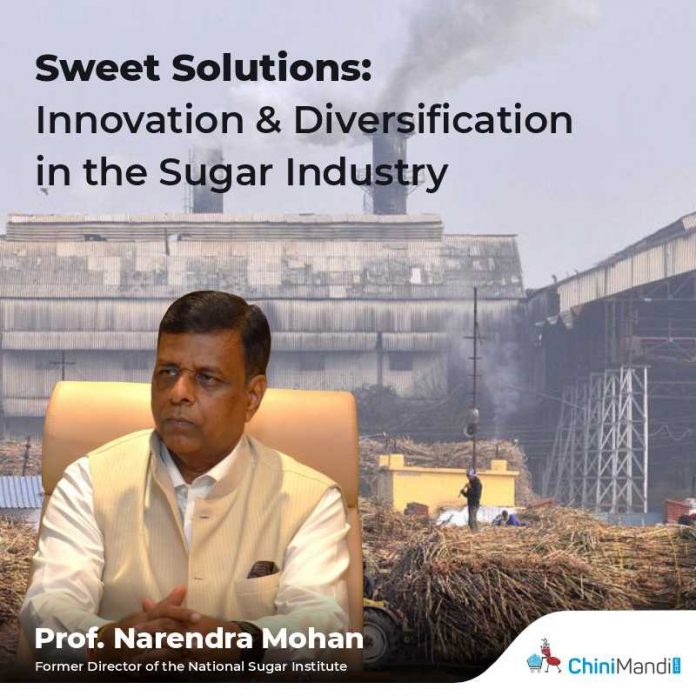There are many factors which influence sustainability of sugar industry and often we talk about three pillars of sustainability i.e. Policy, Productivity and Product. Each one of it is important, as while we need a robust and long term policy framework, it is important to enhance productivities from farm to factory. Further, an important area is about enriching our product portfolio and generating diversified revenue streams for achieving sustainability, said Prof. Narendra Mohan, Former Director, National Sugar Institute, Kanpur.
Today, we look for sustainable sugar industry working on both fronts, economic & environmental, protecting interest of all stake holders including our valued farmers. There may be a question, as to whether diversification can be a choice or necessity. To me, today, as regards sugar industry, diversification is not a choice but necessity. Indian Sugar Industry is an example as to how diversification can help in improving the financial health and making it sustainable, said Prof. Mohan.
Indian sugar industry till couple of decades back was heavily dependent on revenues from sugar only as that was the only product from the industry. In such a scenario, volatility in respect to sugar production and sugar prices, used to adversely affect the profitability of the sugar industry after every few years. The situation used to be alarming particularly in case of surplus sugar production and issues with exports. To make this industry profitable & sustainable, it was considered essential to work on two fronts (1) To address issues related to imbalances in sugar demand-supply scenario (2) Developing more value added products from by products and so as to have more revenue streams.
So, the journey of Indian Sugar Industry over the last few decades, is a journey of transformation through diversification and is better place now. From single product factory producing sugar to sugar+ power, then to sugar+ power+ ethanol and now it is becoming a hub for producing green energy i.e. electricity, ethanol & CBG while looking for green hydrogen, sustainable aviation fuels and many more bio-products. Today, Indian Sugar Industry has diversified its range of sugar qualities too and now it produces sugar of different qualities including specialty sugars required for different sectors earning price premium while looking for healthier and nutritive sugar in future.
But, to remain sustainable, we have to develop “out of box thinking” to exploit potential of entire sugarcane value chain including sugarcane plant residues. In-fact the future of sugar industry lies in converting itself to bio-refineries producing bio-food, bio-energy, bio-chemicals and bio-water. Another area to work upon is for converting waste to wealth. Already there are many examples Indian Sugar Industry has created on capturing carbon di-oxide and to use it for many purposes and recovery of potash from the spent wash or ash of incineration boilers in the molasses based distilleries. This is to be taken forward to have more revenue stream and to address environmental issues too, stressed Prof. Narendra Mohan.
Besides economic sustainability, environmental sustainability should remain high on agenda for the sugar industry. Already taken up by the Indian Sugar Industry, we have to make efforts to minimize fresh water usage from farm to factory and to control emissions in any form.
So, for being competitive, viable and sustainable, diversifications are important and where technology is going to play the dominant role. We have to see that it becomes an industry working 365 days in a year and not for couple of months, opined Prof. Mohan.
















